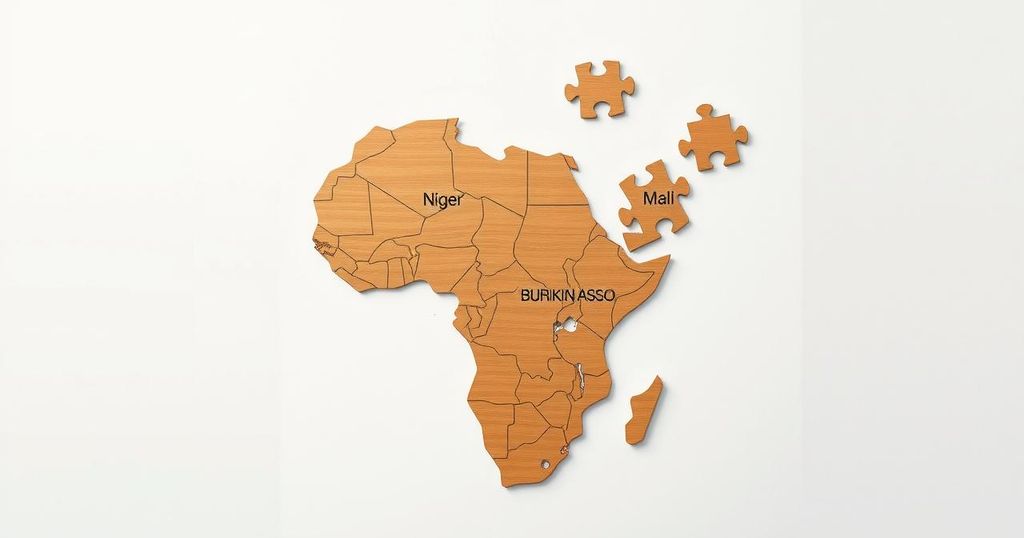Politics
ABUJA, ADAMS OTAKWU, AFRICA, ASIA, BURKINA FASO, CHINA, CI, CONFERENCE OF CIVIL SOCIETIES AND CENTRE FOR CIVIL - MILITARY COOPERATION, ECONOMIC COMMUNITY OF WEST AFRICA STATES, ENVIRONMENTAL PROTECTION, FATF, GHANA, INTERNATIONAL COOPERATION, MALI, MULTINATIONAL JOINT TASK FORCE, NIGER, NIGERIA, REGIONAL COOPERATION, WEST AFRICA
Omar El-Sharif
CIMICO Highlights Consequences of Niger, Mali, Burkina Faso’s Withdrawal from ECOWAS
CIMICO has raised alarms about the implications of Niger, Mali, and Burkina Faso’s withdrawal from ECOWAS, emphasizing security, economic, and humanitarian challenges. The move disrupts vital intelligence sharing and counterterrorism cooperation, risking instability and governance failures while introducing economic uncertainties. The organization encourages dialogue to promote regional integration and strengthen governance structures to mitigate these risks.
The Conference of Civil Societies and Centre for Civil-Military Cooperation (CIMICO) has voiced serious concerns regarding the withdrawal of Niger, Mali, and Burkina Faso from the Economic Community of West Africa States (ECOWAS). This decision is thought to have significant ramifications on security, economics, and humanitarian efforts in the West African subregion. CIMICO warns that the move disrupts vital mechanisms for intelligence sharing and coordinated regional counterterrorism initiatives, such as the Multinational Joint Task Force (MNJTF).
Dr. Adams Otakwu, the group coordinator, addressed the media in Abuja, articulating that the absence of these three nations may aggravate governance challenges, leading to unaccountable regimes and further eroding democratic stability. “We express deep concern over the formal withdrawal of Mali, Burkina Faso, and Niger from the Economic Community of West African States (ECOWAS). This decision carries profound security, economic and humanitarian implications for the people of the region.” This fragmentation in security will expose the region to escalating threats of violent extremism and political instability.
Economically, the withdrawal might introduce considerable uncertainties, such as increased tariffs and inflation, disrupting trade and financial interactions within the region. CIMICO highlights that the departing countries benefitted from ECOWAS’s harmonized trade structures and their exit complicates their standing in the global financial system. Their removal from ECOWAS could severely restrict their access to essential financial frameworks, adversely impacting investment, economic stability, and long-term growth prospects.
The potential socio-economic implications include jeopardizing regional assistance programs and exacerbating poverty levels, ultimately increasing human suffering. Moreover, there is concern about rising hostility towards migrants from Mali and Burkina Faso in neighboring countries. “At a time when regional solidarity is needed most, disengagement from ECOWAS places the lives and well-being of millions at risk.”
CIMICO urges all parties involved to engage in dialogue focusing on regional cohesion, peace, and development. Dr. Otakwu called upon Sahelian states to establish accountable governance structures that can restore trust and facilitate cooperation within West Africa. David Acheme, Executive Director of Community Watch Initiative (CWI), echoed these sentiments by noting that this withdrawal undermines established security coordination and intelligence exchange systems, further complicating the region’s ability to counter insurgent threats effectively. “We know that Mali, Burkina Faso, and Niger have been central to counterterrorism operations and their departure disrupts established mechanisms for security coordination, joint military initiatives, and intelligence exchange.”
The withdrawal of Niger, Mali, and Burkina Faso from ECOWAS marks a significant geopolitical shift in West Africa, potentially undermining regional stability. The three nations play critical roles in combating terrorism and facilitating security collaborations. Their absence from ECOWAS poses risks that could destabilize governance frameworks and hinder economic integration, leading to broader implications for the people in the region.
In summary, the withdrawal of Niger, Mali, and Burkina Faso from ECOWAS poses grave security, economic, and humanitarian challenges for West Africa. The ramifications include disrupted counterterrorism efforts, governance risks, and potential economic instability. CIMICO emphasizes the need for continued dialogue to foster regional unity and cooperation in addressing these pressing issues. The future of democratic governance in the region hangs in the balance, necessitating urgent and cooperative action.
Original Source: tribuneonlineng.com








Post Comment